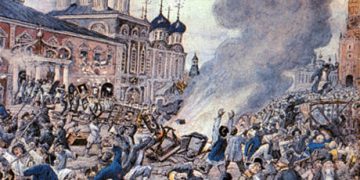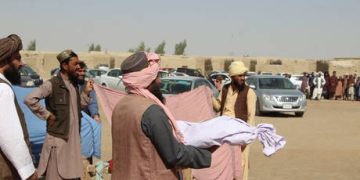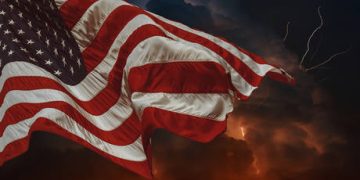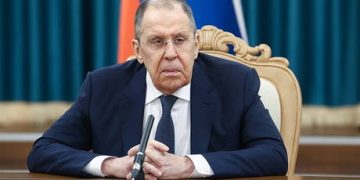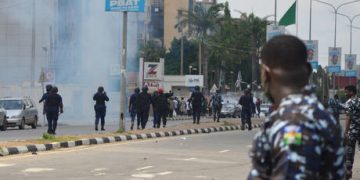September 2, 2025, 9:51 pm
Author – Nick Turse

President Donald Trump said Tuesday that the U.S. carried out a strike in the southern Caribbean against a drug-carrying vessel that departed from Venezuela. “We just … shot out a drug-carrying boat, lot of drugs in that boat,” he said. “These came out of Venezuela.”
A senior U.S. defense official offered a more coherent statement, confirming to The Intercept that “the U.S. military conducted a precision strike against a drug vessel operated by a designated narco-terrorist organization.”
The Tuesday attack is the first acknowledged attack in Trump’s recent ramp-up of U.S. military force in Central and South America. The belligerent foreign relations harken back to early 20th-century military interventions, when the “big stick” approach to the Monroe Doctrine led the U.S. to invade or militarily support favored regimes in the majority of nations in the Western Hemisphere. This gunboat diplomacy risks embroiling the U.S. in additional foreign wars and undermining Trump’s anti-immigration efforts.
The White House and State Department did not reply to request for additional information on the attack.
Last week, the United States dispatched three Aegis guided-missile destroyers to the waters off Venezuela as part of Trump’s supposed war on Latin American drug cartels. All told, seven U.S. warships and one nuclear-powered attack submarine are either in the Caribbean or are expected to arrive there soon. This followed the announcement, last month, that the U.S. was sending thousands of troops to U.S. Southern Command, or SOUTHCOM, which oversees operations in Latin America and the Caribbean, including the deployment of two units trained for amphibious warfare. Trump also secretly signed a directive ordering the Pentagon to begin targeting certain Latin American drug cartels that his administration has deemed terrorist organizations.
Designating cartels as foreign terrorist organizations “has opened a Pandora’s Box for military use of force against them both on foreign soil and in international waters,” Wes Bryant, a former senior targeting adviser and policy analyst at the Pentagon, who was directly involved in counternarcotics activities against both the Taliban and ISIS in Afghanistan, told The Intercept. “If we head down the treacherous path of designating any group or individual person that commits a crime, or even an act of violence, as being part of a terrorist organization in order to justify the use of America’s warfighting capacity, we will find ourselves as a nation falling even further toward militarization and authoritarianism.”
At the same time, the Pentagon has been carrying out numerous training missions, exercises, and conferences — that have mostly been ignored by the press — with military personnel from across Latin America and the Caribbean including Argentina, Belize, Chile, Colombia, Costa Rica, the Dominican Republic, Ecuador, El Salvador, Guatemala, Honduras, Jamaica, Mexico, Panama, Paraguay, and Peru.
“This approach is more likely to strengthen the region’s resolve to partner with countries like China over the medium to long term.”
“These developments together represent a return to a tone-deaf interventionist approach to the region that is likely to further reduce U.S. influence over time,” Erik Sperling of Just Foreign Policy, an advocacy group critical of mainstream Washington foreign policy, told The Intercept. “While the administration may hope to bolster U.S. power in the hemisphere in the short-term with military threats and intervening in Latin American politics, this approach is more likely to strengthen the region’s resolve to partner with countries like China over the medium to long term.”
A U.S. defense official told The Intercept that the surge of troops across the Americas was designed to counter cartels. Stephen Miller, deputy White House chief of staff, echoed these sentiments on Friday, claiming the buildup of forces was aimed to “combat and dismantle drug trafficking organizations, criminal cartels and these foreign terrorist organizations in our hemisphere.”
But the line between a cartel and a government, in the Pentagon’s eyes, is blurring.
In February, Trump designated Venezuela’s Tren de Aragua, MS-13 in El Salvador, and six cartels based in Mexico as foreign terrorist organizations. More recently, the Trump administration added the Venezuelan Cartel de los Soles, or Cartel of the Suns, to a list of specially designated global terrorist groups, alleging that it is headed by President Nicolás Maduro and high-ranking officials in his administration.
Venezuelan officials believe Trump may be renewing long-running efforts, which failed during his first term, to topple the government of Maduro. Maduro was indicted in a New York federal court in 2020, during the first Trump presidency, along with several close allies on federal charges of narco-terrorism and conspiracy to import cocaine. Last month, the U.S. doubled its reward for information leading to the arrest of Maduro to $50 million.
Beginning on August 31, U.S. Marines and sailors from the 22nd Marine Expeditionary Unit began conducting training operations including the amphibious landing of troops on a beachhead in southern Puerto Rico — precisely the type of troops necessary for the invasion of a coastal nation.
“Amphibious operations are … a core competency of the 22nd MEU. They enable the rapid deployment of Marines from naval vessels to shore,” reads a press release issued by the unit on Sunday. “The challenging terrain and tropical climate of Puerto Rico provides an ideal environment for the 22nd MEU to conduct realistic amphibious training and hone specialized skills such as patrolling, reconnaissance, and survival techniques, ensuring a high level of readiness while forward deployed.”
The 22nd MEU did not reply to a request for additional comment on their mission.
The Venezuelan Embassy did not reply to a request for comment prior to publication. The White House did not respond to questions about whether its efforts were leading toward military intervention and regime change efforts in Venezuela.
“The sudden U.S. military escalation in the region — backed both by immigration hardliners like Stephen Miller and neocons like Marco Rubio — reflects Washington’s failure to achieve its regime change objectives in Venezuela,” said Sperling. “Congress has never authorized war with Venezuela, and under the War Powers Resolution, the president is barred from placing troops in situations of imminent hostilities precisely to prevent the executive from provoking attacks to bypass congressional approval. Both Congress and the public should be vigilant in opposing any unauthorized action or manufactured provocation.”

After Trump secretly directed the Pentagon to draw up plans to target cartels, Mexican President Claudia Sheinbaum said, “There is not going to be an invasion.” But her government did send 26 people accused of being high-level cartel operatives to the United States. It was the second such transfer this year, both of which were conducted outside the normal extradition process. “Mexico does what we tell them to do,” Trump said. When asked if he would be ordering U.S. special forces into Mexico to “take out” the cartels, Trump replied: “Could happen … stranger things have happened.”
Bryant says using the military to target cartels is “legally and doctrinally unsound” and could spiral into a war in Mexico involving U.S. forces.
“The Trump administration’s eagerness to deploy the U.S. military in progressively expanded capacity is even more alarming considering Secretary of Defense Pete Hegseth’s rhetoric about American warfighters being solely for the use of violent force — or what he so often refers to as ‘lethality.’ What would the rules of engagement be for U.S. forces sent into Mexico, especially at the objection of the Mexican government? What would the long-term implications be for security and stability across both the U.S. and Mexico?” said Bryant. “Rather than deploying special operations forces to conduct the kind of activities that would likely lead Mexico into full-scale counterinsurgency conflict — with U.S. forces directly entangled — we should instead nourish long-standing law enforcement partnerships.”
Experts have likened Trump’s interventionist efforts in Latin America to President Teddy Roosevelt’s turn-of-the-20th-century “Big Stick” corollary to the Monroe Doctrine. President James Monroe’s 1823 announcement warned the nations of Europe that the United States would not permit the establishment new colonies in America. Roosevelt’s more muscular decree held that Washington had the right to interfere in the internal affairs of countries across the Americas.
In the first quarter of the 20th century, that Roosevelt corollary would be used to justify U.S. occupations of Cuba, the Dominican Republic, Haiti, Honduras, and Nicaragua.
The violent interventions continued throughout the century. A U.S.-backed coup in 1954 in Guatemala ousted democratically elected President Jacobo Árbenz Guzmán over concerns that land reform threatened the profits of the United Fruit Company, a powerful American corporation. During the Cold War, Washington also backed coups that ousted democratically elected leaders in Brazil and Chile, and supported the military junta in Argentina. Direct U.S. military interventions continued as well, from the Dominican Republic in 1965 to Grenada in 1983.
The era of interventions supposedly ended more than a decade ago. “The era of the Monroe Doctrine is over,” then-Secretary of State John Kerry announced in 2013. “The relationship that we seek, Kerry said, is “about all of our countries viewing one another as equals, sharing responsibilities, cooperating on security issues, and adhering not to doctrine, but to the decisions that we make as partners to advance the values and the interests that we share.”
Kerry’s successor, Marco Rubio, travelled to Doral, Florida, on Friday to visit SOUTHCOM headquarters.
SOUTHCOM has been incredibly busy in the last month. The command concluded PANAMAX-Alpha 2025, a three-phase military exercise with Panama that began in March. Around 1,100 soldiers, national guardsmen, airmen and Marines took part in Caribbean Thunder 2025, a training exercise at Camp Santiago in Salinas, Puerto Rico focused on enabling “large-scale combat operations.”
U.S. troops also took part in Southern Vanguard 25, a military exercise in the Chilean Andes, with members of the Chilean, Argentinian and Peruvian militaries. Forces from Special Operations Command South also traveled to Ilopango, El Salvador, to take part in Fuerzas Comando 2025, a multinational exercise involving commandos from 16 nations across the Americas. U.S. Air Force security forces from Moody Air Force Base in Georgia trained in Panama alongside members from Panama’s National Border Service, National Aeronaval Service, and Panamanian National Police. At the U.S. Army Sergeants Major Academy at Fort Bliss, Texas, top noncommissioned officers hosted senior enlisted leaders from the Colombian military. Senior Marines and naval officers from Argentina, Belize, Brazil, Chile, Colombia, Dominican Republic, Ecuador, El Salvador, Guatemala, Honduras, Mexico, Panama, Paraguay, and Peru attended the 2025 Marine Leaders of the Americas Conference in Washington, D.C.
“There are no organizations on this planet that are responsible for more dead Americans than the criminal cartels, the narco-traffickers that are operating in the Western hemisphere,” Miller said on Friday, when asked about the Navy build-up off the coast of Venezuela. “And so, what you are seeing is the resolve of the president and the United States military to combat and dismantle drug trafficking organizations, criminal cartels, and these foreign terrorist organizations in our hemisphere.”
Sperling said he believed the efforts were likely to be counterproductive and result in disaster. “If the U.S. succeeds at militarily escalating the drug war or launching new regime change wars, it will likely spur mass migration and undermine Trump’s own campaign promises,” he told The Intercept. “While some elites and military officials in the hemisphere may gladly accept U.S. funding and training, nobody in the region genuinely believes that the solution to U.S. and European demand for drugs is to wage military campaigns across Latin America.”
The post Trump Boasts of Strike on “Drug-Carrying Boat” from Venezuela appeared first on The Intercept.
Full Article
Author: Nick Turse


